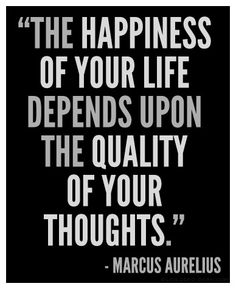We always hear how beneficial it is to think positive and when we think negative we create more stress, worry, depression in our lives. The most successful people in life are the ones who think positive.
Can we control our thoughts? Where do our thoughts come from? What causes certain thoughts to pop into our head?
Does it ever seem like they just come at random, and there’s no rhyme or reason?
All of a sudden a memory from grade school, or something embarrassing you did ten years ago pops into your mind.
How weird is that! Where did that come from?
The bottom line is, thoughts come and go. Trying to control what thoughts occur when, or trying to stop certain thoughts from happening altogether can be impossible.
The truth is that trying NOT to think of something actually makes it more likely that you will. Deliberate attempts to suppress certain thoughts make them more likely to surface. If I tell you not to think of bugs bunny, what do you think you’ll think about?
You may not be able to control your thoughts, but what you can do is become mindfully aware of them. Develop the skill of observing and recognizing your thoughts without getting caught up in them.
Through practice, you can become better at watching your thoughts as they happen (this is the essence of mindfulness and meditation).
The first thing you will notice is there is a constant dialogue in your head — your mind is a thought factory. We are usually only aware of a small portion of the thoughts that are going on in our minds at any given time.
Self-experiment: if you want to prove (or dis-prove) this to yourself, start a timer for 10 minutes, sit down with a pen and paper, and write down every thought you have. You’ll be amazed at the number of thoughts that are bombarding your mind.
Your mind is constantly going. Thoughts pop up and they lead to feelings which lead to behaviors and actions.
Quite often, this thought process (thought-emotion-action) is automatic.
Awareness and observation, however, allow you to interrupt it.
By paying attention on purpose to your thoughts, you can learn not to get swept away by them. You can learn to see them for what they are: temporary interpretations of situations. They come and they go, even though your mind tries to make you believe they are permanent (when you are experiencing anxiety or depression, you think it will never go away…which makes it even worse).
The same is true with feelings and emotions — you don’t have to dwell on them (or wallow in them). You don’t have to follow them down a path that culminates in you acting and reacting in a conditioned manner. You can watch emotions rise, and you can watch emotions cease. Nothing is permanent.
You can notice them, observe them and allow them to move on.
The more you practice this, the better you’ll get at hanging onto the thoughts that empower you and help you be the person you want to be and letting go of the thoughts that disempower you.
You can notice, “I was just thinking what a jerk he is.” And then choose to let that thought and feeling go.
Your awareness of the thought allows you to choose a response versus automatically reacting.
Tell yourself, “it’s just a thought.”
You can notice, “I was just thinking “Why can’t I be more organized?” Again, you can choose to hang onto that thought or you can let it go.”
Just because we think a thought doesn’t make it true and most of our thoughts are not reality, but rather just an interpretation that our mind makes.
Therefore, it’s beneficial for you to mindfully be aware of what you are thinking, and then choose to tell yourself, “it’s just a thought” or “it’s just an interpretation or story my mind made up.”
What matters is how you let your thoughts, and all mental activity, affect you. Thoughts are like clouds floating across the sky: instead of getting caught up in them, you let them pass. They only hold power over you if you grab them, hang onto them and don’t let them go.
Unfortunately, people usually go through life operating on autopilot, being led around by their thoughts. As a result, they have higher levels of stress, anxiety, worry, fear, anger and self-doubt in their lives.
You don’t have to live on autopilot, however. You can start practicing now — become mindful (pay attention on purpose) of your thoughts, and as you become proficient at observing your mind, you’ll begin to interrupt the automatic process of thought-emotion-action.
The more you practice, the better you get. And life improves dramatically as a result.
Start becoming mindful of what’s going on in your mind today! Start to notice, observe and question your thoughts instead of taking them as gospel. Then you can start to manage the process of which thoughts you choose to hold onto and which thoughts you choose to let float on by.
Either you manage your thoughts or your thoughts manage you.



